

Malawi faces a challenge of significant underemployment for women. Over 70% of the overall population live below the poverty line, but when this figure is disaggregated by gender, it is clear that women are harder hit and the strict definition of unemployment disguises the reality for many young women, with an estimated 21% underemployed and almost a third of potential employment falling within the informal sector.
Women must challenge statutory, customary laws and social norms to overcome significant gender disparities which impact on the division of power, participation and control over resources and decision-making. These national level challenges are particularly relevant to the outer suburban areas of the capital city, Lilongwe.
Our partner, Lilongwe Youth Organisation (LYO) is based in the heart of Kauma village, in the southwest of Lilongwe, and are supporting women into work. Their training centre and plot of agricultural land serves the local population, welcoming trainees who are unable to access the formal state education system and providing adapted and supportive training programmes which are nationally accredited.
Read on to find out how recent female graduates are building financial resilience and achieving leadership roles in their community.

Trainees planting crops at the training centre
Most recently, twenty women have completed our Sustainable Agriculture and Beekeeping project. Their training syllabus has covered topics including land preparation, water management and irrigation, crop diversification and rotation, organic manure production.
Working together as a group, the women have mastered growing soya beans, tomatoes, cabbage, fresh green maize and vegetables on the farm at the training centre. The produce has been sold and the profits shared amongst the trainees. Now with the skills they have acquired, the women are able to replicate this food production on their own farms and home gardens, generating a means of subsistence and a source of income.
Alongside sustainable farming and business development skills, the women have learned about bee biology and behaviour, how to manage and maintain a happy hive and harvest and process honey. With six of the project’s 10 beehives already colonised by bees, the trainees are able to extract honey to sell alongside produce from their market gardens.
The project participants were each assessed by the Technical, Entrepreneurial and Vocational Education and Training Authority (TEVETA). All 20 women have successfully completed the project and have graduated with a certificate.
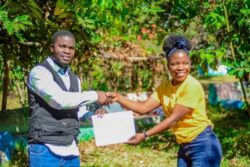
Elizabeth receiving her certificate
Elizabeth Kaziputa
Elizabeth didn’t have any means of earning an income before she joined our project. Now she is able to sell her garden projects and feels more optimistic about her future.
She told us “I am more resilient and ready undertake any urgent occurrence in as far as farming is concerned and my family is enjoying the fruits of the training I attended.”
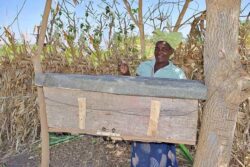
Esinati pictured with one of the project’s beehives
Esinati Sainet
Esinati has acquired the skills she needs to cultivate a range of crops which she sells to support herself and her family.
Esinati said, “The training has helped me to look at myself as a valuable community and family member, because I am using the skills I have acquired to generate income and support my family.”
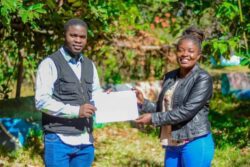
Vetrina receiving her certificate
Vetrina Suwetala
Vetrina has started earning money selling green manure and crops from her garden. She explained that she is now able to save a portion of her earnings, and that her financial resilience has increased.
She told us “My personal well-being has significantly improved because of the skills I have acquired.”
The impact of the learning has extended far beyond the individual trainees and their families. They have also taken their new skills into local communities. A major component of the project was soil conservation and ground preparation, from worm composting (vermicomposting) techniques, to green manure production and incorporation. The women visited 10 local villages where they met with farmers and showed them how they can produce their own composite manure from readily available organic materials so they can mulch and fertilize their crops.
Additional outreach activities have included working with three schools where, with the help of pupils and teachers, the trainees planted 100 mango and guava trees. Each tree has been assigned to an individual student who will be responsible for its nurture and care. As they mature, the trees will provide a source of fresh fruits for students and the community as well adding to the aesthetic of the school compounds.
News of our project even reached national level and the women received a visit by officials from ministry of agriculture. During discussions, the women decided they would ask the ministry for rice seeds. Two weeks later 10kg of hybrid rice seeds arrived. The women have now started to cultivate their rice on half an acre of land near the Lilongwe River. Rice is a new crop for the Lilongwe area, and offers an exciting new opportunity for supplementing the diet and generating an income.
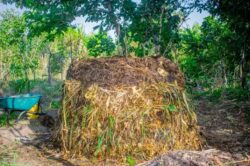
Composite manure production at Mbwetu village
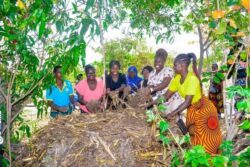
Women creating composite manure
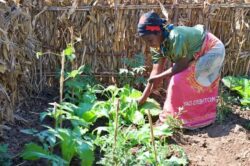
Triphonia Mkande at her home garden
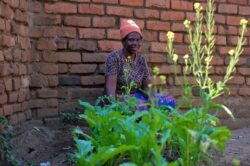
Prisca Matchipisa at her home garden
We are delighted with the reported outcomes from the project with trainees reporting significant change.
• Income Generation: The trainees are able to apply their agriculture and business skills to income generating activities to support themselves and their families. They report their average weekly earnings have increased from nothing before the project to between MWK12,5000 and MWK20,000.
• Financial Resilience: The women have told us that their ability to withstand the financial shocks has increased.
• Well-Being: A comparison of the data at the start and end of our project shows that the well-being of most of the trainees has also improved as a result of training
• Increased community engagement: The project attracted the interest of more community members who were keen to learn about agricultural activities. There was a particular interest in composite manure production. Our trainees have shared their knowledge with other community members who have produced their own manure and applied to their farms.
• Empowerment and leadership: 3 women have now been given leadership roles at churches’ women committee and 2 women are now members of the parents and teachers associations for 2 schools in Kauma.
• Unexpected crops or products: Participants have managed to grow Rice which is a new a crop in the area. People were sceptical about the performance of this crop, but it is doing very well and and the harvest will be shared.
• Networking and collaboration: Participants have now formed networks and collaborations with other farmers and organisations leading to new opportunities and resources.
• Personal transformation: Participants are experiencing personal growth, increased confidence, and improved self-esteem through their involvement in the project.
Projects such as these would not be possible without you. If you would like to support our life-changing projects, please click here to give a one-off gift or set up a regular donation. Thank you.
November 2024